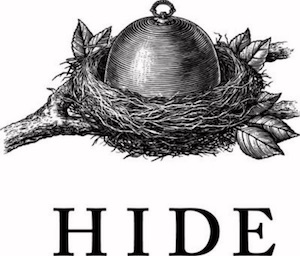Julien Sarrasin – Head Sommelier at Hide Restaurant Piccadilly
How long have you been at the restaurant?
I started working at Hide on the 7th of August 2018
What attracted you to become a sommelier?
I worked in a restaurant for the first time by chance. I came to England to improve my English and worked as a commis waiter in a Michelin starred restaurant in London as my first job. I liked the world of hospitality and decided to pursue a career in it. Initially, I focused on cocktails and bartending and was attracted by mixology and all the possible combinations of flavours but then finally decided to take the wine path and transferred this creativity into food and wine/beverage pairing.
Where did you do your training?
I started learning about wine at the restaurant Club Gascon in Farringdon. I returned to France for quite a formative year and returned to England at the same restaurant, where I learned more, and eventually came to Hide where the learning didn’t stop. I have been learning every day since I started.
What would you say were the essential skills required to be a sommelier?
Humility, understanding of guest needs and a thirst for knowledge and discovery. Additionally, you need to have a strong passion and enthusiasm for hospitality in general and what you do on a daily basis whilst simultaneously communicating this to the people you work with. You also need to be a great host to your guests which is what hospitality is all about.
What wines complement your personal favourite three course meal and why?
This really depends on the food which is going to be served, although I like starting with a fresh, clean, incisive, low dosage sparkling wine. Then I would probably go toward a Chenin Blanc, probably from the Loire Valley, but South Africa is also a country giving beautiful examples of these grapes. Then a Syrah, fresh slightly reductive and earthy with a bright floral and spicy bouquet. I also enjoy well vinified orange wines, which I think is always a good alternative to other more classic styles of wine.
What are your thoughts on the “Red wine with red meat, white wine with white meat and fish” age-old debate?
Age old debate indeed, I tend to like bending the ever established “rules”. We can all agree on some food elements really disturbing some wines and being a strong “no”. However, I like to occasionally take risky paths with wine pairings which may challenge the status quo, and at Hide, I am currently serving a delicious, vibrant and crunchy pinot noir from Moravia by Jaroslav Springer with the seabass dish, and considering the feedback, it seems to be a success.
Likewise for meat and white wines, depending on what accompanies the main element of the plate, condiments and sauce, you may want to choose a white wine as opposed to a more classic red with your meat course.
This all comes down to personal preferences and the individual, but if the logic is there and communicated effectively, I don’t think there’s a reason why other roads shouldn’t be explored.
How does the choice of the right wines complement the different food courses served?
I feel like when you start to be comfortable in your association of wines with food, the ultimate possible outcome is to have the combination of both improve one another a greater deal than enjoying the wine and food separately. There are a large range of wines that can complement a single dish well, and vise versa, but finding the pairing that will elevate both the food and the chosen wine is the pinnacle of our daily devotion as a sommelier in order for the food to shine and give its best.
What’s the best part of your job?
There are many great advantages of being a sommelier and I see this role as a relatively privileged position amongst the front of house team. As a role, I would say that along with our colleagues, it is being able to positively add up to the overall experience given to the guest, and again, being the best possible host.
I thoroughly enjoy the creative part of my role of pairing the exceptional, subtle and refined dishes of Ollie Dabbous. This has always been at the centre of my everyday tasks, I guess this is one of my strengths as head sommelier, having this awareness of food and wine together. I was always around the kitchen when my respective grandmothers and mother were cooking and have always been included in interacting with flavours. I have also been raised by women mostly, my dad was very present too but I guess being surrounded by these women helped me develop a sensibility which I may not have had if not.
And the worst?
Who said there was a worst part..?
What is the unusual wine that you have ever tasted and why?
Probably the first time I have tried Vin Jaune I was quite a shock. I did struggle to understand whatever I was experiencing in terms of flavours and sensations and to be honest, I didn’t like it at all.
After sampling this type of wine again it kind of grow in me and now became one of my favourite style of wine.
I am sure taste evolves as you grow but also revisiting occasionally a something you weren’t sure of and trying to understand what is it your are tasting, with the appropriate meal helps to appreciate it more and more.
What is the most money that you’ve ever seen spent on a single bottle?
I have served a 50cl rare bottling of the very first vintage (1992) of one of the flagship and most sought-after American wines Screaming Eagle Estate based in Napa Valley for, off the top of my head, £17,540.00.
Yes, it was delicious.
How many wines do you have?
I do collect wine with one objective in mind: consuming and share with my dear friends and family. Wine is a great source of investment, I haven’t personally ventured into this realm and focus on enjoyment through consumption. I would say that I have about 500 / 600 bottles in France, stored properly, away from temptation, and a few here in London.
Now, if we talk about Hide and its wine list, thanks to the great partnership with Hedonism Wines, we are able to offer close to 7,000 wines on a daily basis. This is insane, but very exciting and entertaining.
How often do you find that customers complain about wine being corked and – in your opinion – how often do you think that they are right?
We do as a rule assess the quality of every wine at the opening to understand whether or not the wine has a fault. If this is the case, the guest will be told about it while we organise another bottle (if available). If we think the wine is in good condition and shows the quality of its origin and stage of life, we will offer the guests to taste it to confirm this.
It may happen to have a disparity of judgement on this matter, but we handle it very nicely, try to offer decanting, a different set of glassware or temperature of service to try and give the guest the best out of this wine.
Wine is also an education you see, not everyone is able to taste as many wines as a sommelier does therefore you need to be diligent enough to explain to the guest that what they are experiencing is what is accepted for such a wine, and try to gently give them the tools for enjoying this very wine in the best possible way.
This is why when you give some recommendations about wines from your list to the guests you should always take into consideration what their usual preferences are and be as accurate as possible in the use of terminology in regards to sensations, flavours and styles. It’s not always an easy task to hit the spot perfectly but it is always very rewarding when people are thankful for the discovery.


